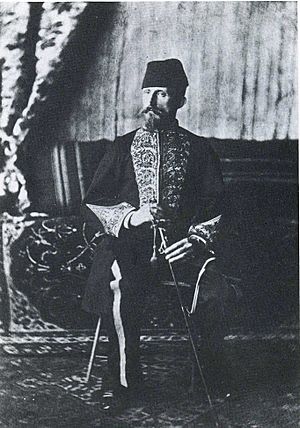Carl Christian Giegler facts for kids
Quick facts for kids
Carl Christian Giegler
|
|
|---|---|

Giegler Pasha in 1883
|
|
| Acting Governor-General of Sudan | |
| In office 4 March 1882 – 11 May 1882 |
|
| Preceded by | Muhammad Rauf Pasha |
| Succeeded by | Abdel Qadir Pasha Hilmi |
| Personal details | |
| Born | 4 January 1844 Schweinfurt, Kingdom of Bavaria |
| Died | 31 August 1921 (aged 77) Schweinfurt, Bavaria, Weimar Republic |
| Nationality | German |
| Occupation | Engineer |
Carl Christian Giegler (or Giegler Pasha) was a German engineer born on January 4, 1844. He was known for his work with telegraphs. From February to May 1882, he served as the acting governor-general of Sudan. At that time, Sudan was a province of Egypt. His time in office was at the start of the Mahdist War, a major uprising in the region. He passed away on August 31, 1921.
Contents
Early Life and Career Beginnings
Karl Giegler was born in 1844 in Schweinfurt, a town in Bavaria, Germany. He first trained as a watchmaker. Later, he found a job with the company Siemens. He worked in their factory in Woolwich, London, which made equipment for telegraphs. In 1872, Giegler was looking for a new challenge. He decided to take a job building telegraph lines in Sudan.
Building Telegraphs in Sudan
Giegler became an officer in the Sudan telegraph service in 1873. On his way to Khartoum, he visited many ancient Egyptian monuments. He wanted to see the "magnificent remains of a vanished cultural epoch." He spent time in Luxor, Philae, and Abu Simbel. He also saw the pyramids of Nuri and Jebel Barkal in June 1873. He arrived in Khartoum in July 1873.
In 1874, Giegler checked the telegraph line to the north. On his return, he visited the old ruins of Meroë. Giegler focused on his work and saved his money. He renewed his contract after three years. In 1875, he became the director of telegraphs in Khartoum.
In 1876, the German-Russian explorer Wilhelm Junker met Giegler in Khartoum. Giegler was described as a tall man with a red beard. People sometimes thought he was English. By 1878, Giegler was promoted to director-general of Sudan Telegraphs. He also became the director of the Sudan postal service that same year. He worked in the telegraph service in Sudan until 1883.
Giegler's Role in Sudan's Government
Charles George Gordon Pasha became the governor-general of Sudan in May 1877. Giegler and Gordon did not always agree. Giegler even thought about quitting his job. However, Gordon named Giegler as his deputy governor-general of Sudan. Giegler kept this important role after Gordon left office in 1880.
Giegler served as deputy governor-general from 1879 to 1882. He worked under Gordon, Muhammad Rauf Pasha, and 'Abd al-Qadir Hilmi. Giegler did not fully understand the importance of the Mahdist revolt. He, like many British officials in Egypt, thought it was not a big deal.
In June 1881, Giegler was in El-Obeid when the Mahdist movement first appeared. He wrote that he was "not greatly impressed by the news." He believed that more serious events had happened before. After Rauf Pasha failed to defeat the Mahdi, Giegler still thought it would have been better to ignore the whole situation.
Acting Governor-General
Giegler Pasha became the acting governor-general after Rauf Pasha was removed in February 1882. He held this position until 'Abd al-Qadir arrived in May 1882. Giegler officially started as acting governor-general on March 4, 1882.
After taking office, he sent a message to Cairo. He stated that his forces were strong enough to handle the Mahdist revolt. He felt he did not need more troops. He sent Yusuf Pasha Hasan al-Shallili, the governor of Sennar, to attack Jabal Qadir with 3,000 men. When these troops left, another local uprising began. Giegler used local forces to stop this new revolt.
Giegler managed to prevent the Mahdist movement from spreading in the Gezira region. However, he was wrong to think that al-Shallali's local forces could defeat the main Mahdist army. The new governor-general, Fariq Abdel Qadir Pasha Hilmi, arrived in Khartoum on May 11, 1882. By the end of May, al-Shallili's forces were defeated by the Mahdists at Jabal Qadir.
Giegler was removed from his deputy governor-general role in June 1882. He was then made an inspector-general for stopping certain illegal activities. He briefly served as deputy governor-general again. Finally, he left Sudan in March 1883.
Life After Sudan
In 1883, Giegler became a member of the Suez Canal Company. On January 26, 1884, Giegler met with Gordon Pasha and other important figures. They met with a former trader named Al-Zubayr Rahma Mansur. They wanted him to help fight against the Mahdi. They even offered him the position of governor. However, the government in London did not approve this appointment.
Giegler went back to Germany in 1893. Between 1897 and 1904, he wrote his life story. He used his diary notes and reports from his many trips. He likely wrote these memoirs for his family. In his writings, he shared his strong opinions about some people he had worked with. He described Frank Lupton as one of the few helpful Englishmen in Sudan.
Carl Christian Giegler died in Schweinfurt in 1921.
 | Percy Lavon Julian |
 | Katherine Johnson |
 | George Washington Carver |
 | Annie Easley |

